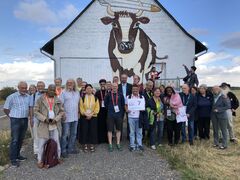Bell/Büchel. In 2013, the World Council of Churches (WCC) assembly in Busan, South Korea, called Christians to embark on a pilgrimage of justice and peace. All over the world, people have since set out to work for peace, justice and sustainability. As part of the WCC assembly in Karlsruhe, Germany, representatives from many churches also set out on a "Pilgrimage for a Nuclear-Weapon-Free World". The journey was co-organized by the Regional Service of the UEM's German Region. They made stops in Bingen on the Rhine, Bell in Hunsrück and Büchel in the Eifel.
It was a pilgrimage of contrasts. In Hunsrück, where in the 1980s Christians powerfully raised their voices against the planned stationing of nuclear missiles, today there are no longer any nuclear weapons. In Büchel, on the other hand, the last nuclear weapons on German soil are stored to this very day. And here, too, Christians are committing themselves to a world without these weapons of mass destruction. This is what connects these two places.
"It is a great honor for us that you are all here today," Pastor Dr. Matthias Engelke welcomed the guests from the ecumenical community in Büchel in front of the air base. "We are grateful that you share this place of pain with us here, because U.S. nuclear weapons are stored here, and German pilots are training to use them," he added. These weapons, he said, are capable of destroying all of humanity. "The only protection against this is the complete disarmament of all nuclear weapons," Engelke said.
In view of the planned modernization of nuclear weapons in Büchel and also the stationing of new fighter jets, Christine Busch, longtime ecumenical officer of the Evangelical Church in the Rhineland and current chairwoman of the Action Community Service for Peace, urged people to follow the peaceful path of Jacob in the Old Testament, who went to meet his brother Esau's force, reconciled and moved on with his children and livestock.
"As God's people on pilgrimage, we look for where peace is made. When soldiers declare they want nothing more to do with nuclear weapons, when people pledge to work for nuclear disarmament and when states ratify the Treaty on the Prohibition of Nuclear Weapons," said Matthias Engelke and Christine Busch.
A world without nuclear weapons. In Hunsrück, this has been a reality for three decades. "Our protest in the 1980s changed the region here, it is a place of hope," emphasized Pastor Jutta Dahl, then as now active in the Hunsrück peace movement and the first winner of the prestigious Aachen Peace Prize. In the Protestant parish hall in Bell, she described the experiences of that time to the guests from the ecumenical community.
"People here learned that you should stand by your opinion and that you can change things. And Christians have learned that it is helpful in this to take ministries out of the churches into the real world, where the bleeding wounds are," she emphasized. The Gospel can help strengthen faith in nonviolence, overcome fears and accept one another in all our differences, the pastor made clear.
It was this contrast that made this pilgrimage exciting. It visibly impressed the participants from the WCC. Bishop Awkin Kuriakose from the Assyrian Church of the East in India, thanked the participants for the diverse experiences and adventures on this pilgrimage to the Eifel and the Hunsrück. After the service on the peace meadow in front of the air base in Büchel, a pastor from Switzerland made it emphatically clear: "Nuclear weapons destroy life, therefore they are to be outlawed and destroyed". And Pastor Shella Harvey of the United Church of Christ in Florida said in Büchel: "That's why we are here, to stand up for peace and justice for all people." The congregations in Bingen are also making their contribution to this, as part of a community that is constantly working for peace and practicing a common faith practice and interreligious dialogue.
This pilgrimage had been organized by the ecumenical project group "Churches against Nuclear Weapons", which has been inviting people to a Church Action Day in Büchel once a year since 2018.
The group was accompanied, among others, by Pastor Helmut Müller, a member of the Regional Service of the UEM and responsible for the Cologne Bonn region. People from many churches currently gathered in Karlsruhe accepted this invitation, for example from the Waldensian Church in Italy as well as from the Church in Fiji, the Lutheran Church in Norway, the Russian Orthodox Church, the Protestant Church of the Netherlands, the Church of Ireland and many other churches from all over the world. In Büchel and Bell, they spoke with peace activists. And those impressions they took back with them to Karlsruhe for the Assembly.





